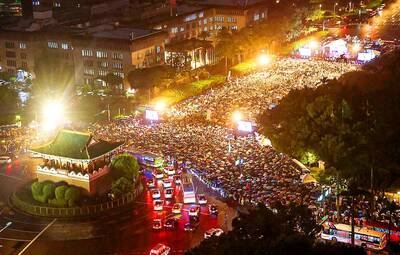The number of Chinese cyberattacks targeting Ministry of Foreign Affairs computer systems last year was about 39 times greater than the number of attacks in 2018, a source said on Monday.
There were an average of 2,100 attacks daily last year, and nearly 770,000 attacks in total, up from about 20,000 attacks in 2018, the source said, adding that information security officials have expressed serious concern about the situation.
Attacks have also become more sophisticated, they said.
“Last year, the Ministry of Foreign Affairs began more closely monitoring all probes and scans of its systems, taking the stance that it would rather risk erroneously terminating a legitimate connection than overlooking a genuine attack,” the source said.
Its allocation of resources for tackling cyberattacks was the reason the ministry’s annual budget was increased last year, they said.
Its request of NT$297.59 million (US$10.43 million) for the “management of information security” was used to upgrade computer systems, including network equipment; lease a dedicated transnational backbone network; and establish an information security monitoring center, the source said.
Of the attacks the monitoring center detected last year, about 410,000 were scans and probes of the ministry’s computers and close to 150,000 were attempts to break into its e-mail system, they said.
“Since adjusting its approach to cyberattacks last year, the ministry is now analyzing every hacking attempt, and using that information to help it block such attempts more quickly,” the source said.
“This approach requires more effort, but the ministry is able to stop attacks before sensitive information is compromised,” they said.
The ministry is one of the most attacked government bodies, second only to the Presidential Office.
The ministry in the past few years has been encouraging Taiwanese to register personal information with it when traveling abroad, so that it can more easily provide consular assistance in emergency situations, the source said, adding that the information would be securely transmitted to its representative office in the traveler’s destination country.
However, Chinese hackers broke into the ministry’s secure e-mail system in 2017, stealing the personal information about 10,000 Taiwanese.
After the incident, the ministry secured its e-mail system, and has not experienced a similar incident since, the source said.

The Central Weather Administration (CWA) today issued a "tsunami watch" alert after a magnitude 8.7 earthquake struck off the Kamchatka Peninsula in northeastern Russia earlier in the morning. The quake struck off the east coast of the Kamchatka Peninsula at 7:25am (Taiwan time) at a depth of about 19km, the CWA said, citing figures from the Pacific Tsunami Warning Center. The CWA's Seismological Center said preliminary assessments indicate that a tsunami could reach Taiwan's coastal areas by 1:18pm today. The CWA urged residents along the coast to stay alert and take necessary precautions as waves as high as 1m could hit the southeastern

FINAL COUNTDOWN: About 50,000 attended a pro-recall rally yesterday, while the KMT and the TPP plan to rally against the recall votes today Democracy activists, together with arts and education representatives, yesterday organized a motorcade, while thousands gathered on Ketagalan Boulevard in Taipei in the evening in support of tomorrow’s recall votes. Recall votes for 24 Chinese Nationalist Party (KMT) lawmakers and suspended Hsinchu City mayor Ann Kao (高虹安) are to be held tomorrow, while recall votes for seven other KMT lawmakers are scheduled for Aug. 23. The afternoon motorcade was led by the Spring Breeze Culture and Arts Foundation, the Tyzen Hsiao Foundation and the Friends of Lee Teng-hui Association, and was joined by delegates from the Taiwan Statebuilding Party and the Taiwan Solidarity

Instead of threatening tariffs on Taiwan-made chips, the US should try to reinforce cooperation with Taiwan on semiconductor development to take on challenges from the People’s Republic of China (PRC), a Taiwanese think tank said. The administration of US President Donald Trump has threatened to impose across-the-board import duties of 32 percent on Taiwan-made goods and levy a separate tariff on semiconductors, which Taiwan is hoping to avoid. The Research Institute for Democracy, Society, and Emerging Technology (DSET), a National Science and Technology Council think tank, said that US efforts should focus on containing China’s semiconductor rise rather than impairing Taiwan. “Without

The National Museum of Taiwan Literature is next month to hold an exhibition in Osaka, Japan, showcasing the rich and unique history of Taiwanese folklore and literature. The exhibition, which is to run from Aug. 10 to Aug. 20 at the city’s Central Public Hall, is part of the “We Taiwan” at Expo 2025 series, highlighting Taiwan’s cultural ties with the international community, National Museum of Taiwan Literature director Chen Ying-fang (陳瑩芳) said. Folklore and literature, among Taiwan’s richest cultural heritages, naturally deserve a central place in the global dialogue, Chen said. Taiwan’s folklore would be immediately apparent at the entrance of the